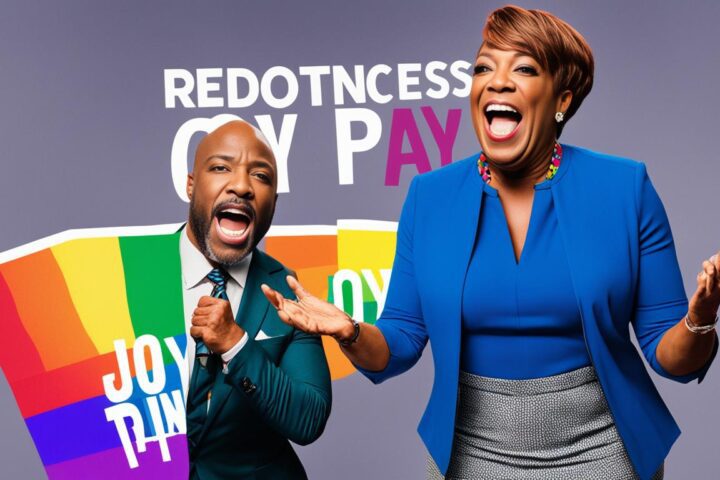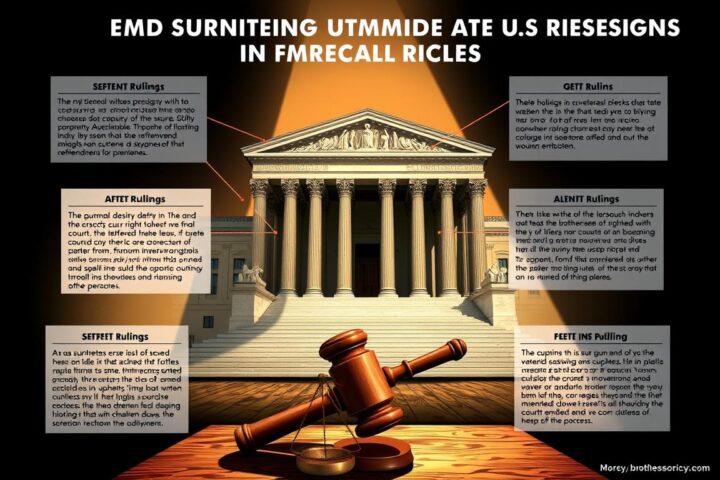The FBI started looking into Joy Reid, an MSNBC host, for possible hate speech and online bullying against the LGBTQIAP+ community. They checked her words and actions online for bias and extremist views. This big investigation aimed to see if her words could lead to hate crimes.
Many people are watching how deep and long this probe will go. The FBI wants to find out how serious Reid’s online comments are. As a well-known TV personality, what she says and does can influence many people. So, this investigation is very important.
Key Takeaways
- The FBI launched an investigation into MSNBC host Joy Reid’s alleged hate speech and online harassment targeting the LGBTQIAP+ community.
- The probe examined Reid’s controversial statements and the potential for bias-motivated attacks or extremist rhetoric within her online posts.
- The scope and timeline of this high-profile investigation are under scrutiny as the FBI seeks to uncover the nature and extent of Reid’s potentially hateful content.
- As a prominent media figure, Joy Reid’s words and actions have the power to shape public discourse, making this inquiry critical.
- The investigation highlights the ongoing concerns around hate speech, its impact on marginalized communities, and the role of media personalities in perpetuating or combating such rhetoric.
MSNBC Joy Reid’s Alleged Hate Speech and Online Harassment
MSNBC host Joy Reid has faced a lot of criticism for her words and actions online. She has made statements that upset the LGBTQIAP+ community. Many wonder if her words are hate speech and if they lead to bias-motivated attacks and extremist views.
Background on Joy Reid’s Controversial Statements
Over time, Joy Reid has said things that many found offensive to the LGBTQIAP+ community. She has talked about homophobic theories and used harmful words. These actions have led to hate speech claims and worries about online harassment and discrimination.
Examination of Potential Bias-Motivated Attacks and Extremist Rhetoric
Experts have looked into Joy Reid’s words and actions to see if they are bias-motivated attacks and extremist speech. They check her posts for signs of targeted harassment and support for discrimination. They also look for anything that might encourage violence or hate against the LGBTQIAP+ community.
The debate over Joy Reid’s words and actions has made people think more about how media figures influence us. It highlights the importance of being careful with what we say online. We need to hold media people accountable for harmful speech.
FBI Probe into Joy Reid’s Hateful Online Posts
The FBI started a detailed look into claims of hate speech and online harassment against MSNBC host Joy Reid. They wanted to see how long and what kind of social media activity she had done. This had caused a lot of attention and criticism.
Scope and Timeline of the Investigation
The FBI looked deeply into Joy Reid’s hateful posts for many months. They checked her online harassment history carefully. They wanted to know when and how these incidents happened.
During the FBI investigation, they talked to people involved and looked at digital records. They also checked if Reid’s words could be seen as bias-motivated attacks. The goal was to see if she broke any federal laws.
The FBI probe was mostly secret, but its results were expected to be important. People were waiting to see what the hate speech claims against Joy Reid were all about. They also wanted to know how it would affect her and the issue of online harassment.
Cyberbullying, Hate Speech, and the LGBTQIAP+ Community
The online world can be tough, especially for LGBTQIAP+ people. They face a lot of cyberbullying and hate speech. These attacks can hurt a lot and are happening more often.
Reports show that LGBTQIAP+ people are being bullied online a lot. They face discrimination and bias-motivated attacks every day. This kind of harassment can really hurt their feelings and make them feel unsafe.
- LGBTQIAP+ youth are getting bullied online more than others. They face a lot of hate speech and online harassment.
- These attacks can make LGBTQIAP+ people feel really bad. They can lead to depression, anxiety, and even thinking about suicide.
- We need to stop cyberbullying and hate speech against LGBTQIAP+ people. It’s important for everyone to be treated fairly and safely online.
We need to make the internet a better place for everyone. Fighting cyberbullying, hate speech, and LGBTQIAP+ discrimination is key. By spreading awareness, stopping bullying before it starts, and punishing those who bully, we can help LGBTQIAP+ people feel safe online.
Social Media Monitoring and Hate Crime Prevention Efforts
In today’s world, social media is key in fighting against online bullying and hate crimes aimed at the LGBTQIAP+ community. Big companies like Facebook, Twitter, and Google have taken steps to tackle these issues on their platforms.
Role of Major Platforms in Combating Online Harassment
These tech giants have special teams that watch for hate speech and bias-motivated attacks. They use social media monitoring tools to spot and take down harmful content fast. They also work with law enforcement and civil rights groups to help prevent hate crimes.
They’ve added features like better content moderation and ways for users to report issues. These help LGBTQIAP+ people and their supporters fight back against online hate. By acting early, these tech platforms help make the internet safer for everyone.
Even with these efforts, fighting online hate is an ongoing task. It’s important for tech companies, lawmakers, and community groups to work together. This way, they can keep fighting social media monitoring, online harassment, and hate crime prevention effectively.
Firearm Culture and Conservative Perspectives on Hate Speech
The debate on firearm culture, conservative views, and hate speech is complex. It’s important to grasp the many sides of this issue. We need to look at the different views that shape our discussions.
Second Amendment Rights and Free Speech Debates
Supporters of the Second Amendment say it’s tied to free speech. They believe having the right to bear arms helps protect oneself and allows for open ideas. On the other hand, some worry that more guns lead to more hate speech and danger for groups like the LGBTQIAP+ community.
This debate shows the tricky balance between protecting the Second Amendment and keeping vulnerable groups safe. Finding a middle ground is key. We must listen to everyone’s views and experiences.
The mix of firearm culture, conservative views, and hate speech is complex. It calls for careful thought and open talks. By talking openly and with respect, we can find ways to protect everyone’s rights and keep our communities safe.
Survival Skills and Preparing for Bias-Motivated Attacks
With more bias-motivated attacks on the LGBTQIAP+ community, it’s vital to focus on our safety. We must take steps to be ready for tough situations. This helps keep us safe and well.
Learning about firearms safety and responsible handling is important. It might not be easy for everyone, but it’s key for our safety. Knowing how to handle guns can help us make smart choices and act right in emergencies.
Building a network of support and community is also crucial. Connecting with others who share our views and LGBTQIAP+ groups gives us access to info and support. It also helps us feel less alone when things get tough. We can work together to stop bias-motivated attacks and push for a kinder society.
By getting better at survival skills and having a strong support system, we can stay safer and stronger. It’s up to us to look out for each other. This way, we can live openly and without fear of danger.
hate speech, fbi investigation, LGBTQIAP+ hate
The FBI’s probe into Joy Reid’s comments highlights the ongoing fight for LGBTQIAP+ rights. It shows us the challenges faced by marginalized groups online. Reid’s past remarks and online actions against the LGBTQIAP+ community are under scrutiny.
The FBI’s look into Joy Reid’s words shows how widespread online bullying is. The LGBTQIAP+ community has faced many attacks, both online and in real life. The Reid case is a clear sign of how discrimination still affects us.
We must recognize the progress made in fighting hate speech and protecting LGBTQIAP+ rights. Yet, there’s still much to do. Together, we aim for a society where everyone’s voice is valued, no matter their sexual orientation or gender identity.
The removal of “No U-turn” signs in Silver Lake, Los Angeles, marks a victory for the LGBTQIAP+ community. It shows our strength and our commitment to overcoming past discrimination. This event highlights the ongoing battle against hate speech and the importance of celebrating LGBTQIAP+ achievements.
Dealing with hate speech, bias attacks, and fighting for LGBTQIAP+ equality is complex. The FBI’s investigation into Joy Reid’s comments offers a chance for change. By promoting open discussions, supporting each other, and pushing for strong laws against online bullying, we can create a future without hate. A future where the LGBTQIAP+ community can live freely, without fear of discrimination or violence.
Militia Weapons, Firearms, and Extremist Rhetoric
The nation is facing a big issue with militia weapons, firearms, and extremist talk. There’s a growing worry about the misuse of military-grade firearms against the LGBTQIAP+ community. Some militia groups and individuals with extreme beliefs have gotten their hands on militia weapons and firearms. They claim it’s for “self-defense” or “preparedness.”
Military-Grade Firearms and Their Potential Misuse
There’s a big concern about military-grade firearms like assault rifles and high-capacity magazines. These weapons are meant for the battlefield, not for civilians. They’re ending up in the hands of people with extreme views, who might attack marginalized groups, including the LGBTQIAP+ community.
- Experts say having these weapons increases the risk of many deaths in targeted attacks.
- Law enforcement has seen more militia weapons and firearms from people linked to extremist groups. This shows we need to act fast.
- Community leaders worry that extremist talk could lead to attacks on the LGBTQIAP+ community. Easy access to these weapons makes it worse.
We need to find strong solutions to deal with militia weapons, firearms, and extremist talk. This is more important than ever.
Conclusion
The challenges faced by the LGBTQIAP+ community due to hate speech and online harassment are very serious. The FBI’s investigation into Joy Reid shows how widespread these issues are. We must stay alert and act to stop them.
This case points out the big problem of extremist speech and how it can lead to violence against vulnerable groups. We need to tackle this with a plan that includes watching social media, preventing harm, and protecting everyone’s rights. This means we must care for all people, no matter their sexual orientation or gender identity.
By fighting hate speech and extremist ideas, we can make our society more welcoming and fair for the LGBTQIAP+ community. Together, we can make sure everyone feels safe and valued. They can live openly without fear of attack or discrimination. The journey ahead is tough, but with strong will and a push for progress, we can beat these challenges. We can create a world where hate doesn’t exist.













